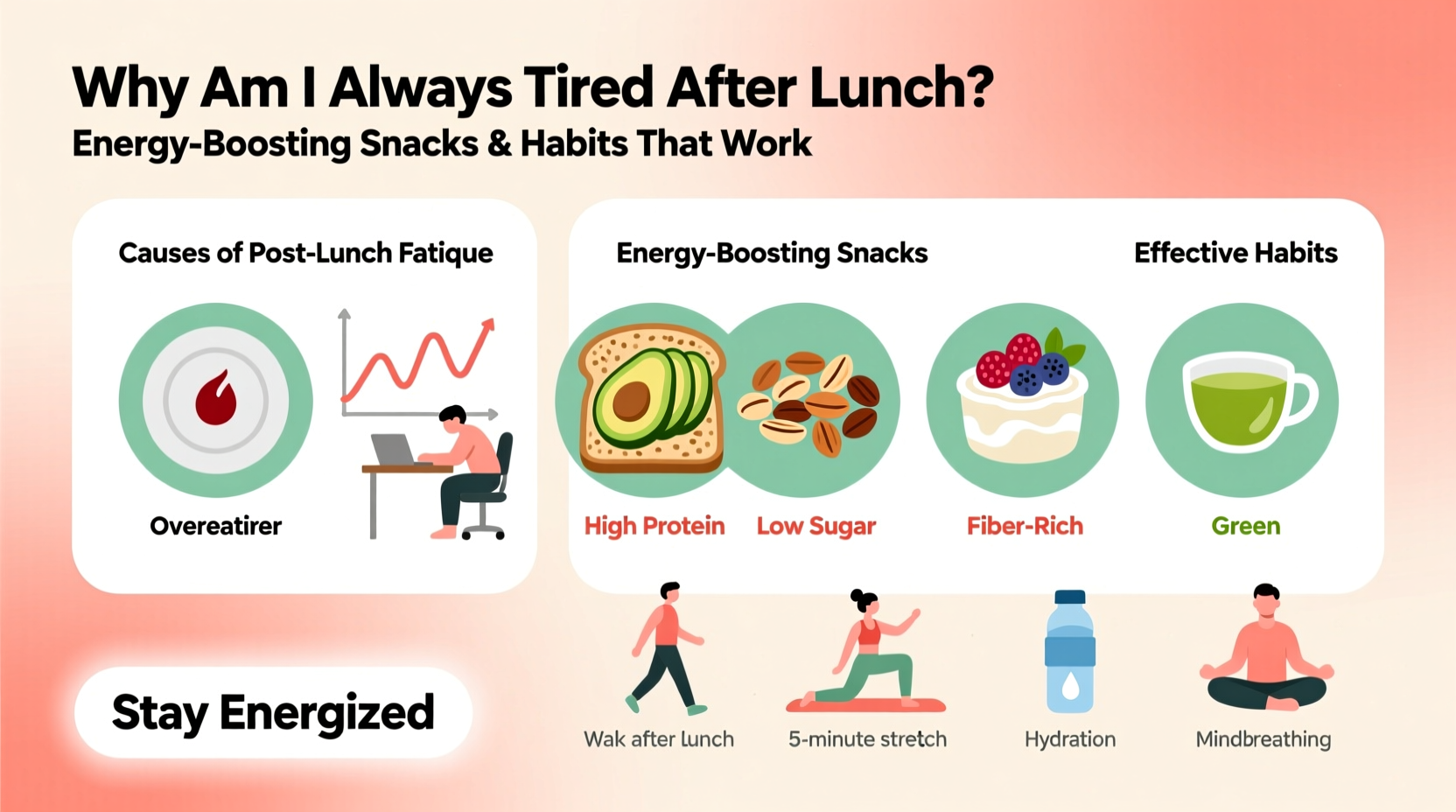After a satisfying midday meal, many people find themselves battling fatigue, struggling to focus, or even nodding off at their desks. This post-lunch slump is more than just inconvenient—it can derail productivity and affect your overall well-being. While it might seem normal, chronic afternoon exhaustion isn't inevitable. Understanding the biological and behavioral causes behind this fatigue—and knowing which snacks and habits truly boost energy—can transform your afternoons from sluggish to energized.
The Science Behind Post-Lunch Fatigue

Feeling tired after eating is not simply a sign of laziness or poor willpower. It’s rooted in physiology. After a meal, especially one high in carbohydrates or fats, your body diverts blood flow from the brain and muscles to the digestive system. This shift supports digestion but reduces alertness and cognitive function. Additionally, insulin release following carbohydrate consumption can lead to a temporary drop in amino acids like tyrosine and phenylalanine—precursors to dopamine and norepinephrine, neurotransmitters responsible for wakefulness and focus.
Your circadian rhythm also plays a role. Most humans experience a natural dip in alertness between 1:00 PM and 3:00 PM, regardless of food intake. This biological lull, combined with dietary choices and lifestyle habits, creates the perfect storm for post-lunch fatigue.
“Post-meal drowsiness often results from both metabolic changes and timing aligned with our internal clock. The key is managing what you eat and when.” — Dr. Lena Patel, Sleep and Circadian Neuroscientist
Energy-Boosting Snacks That Actually Work
Not all snacks are created equal. Choosing the right ones can stabilize blood sugar, support mental clarity, and prevent the crash that follows sugary or processed options. The best energy-boosting snacks combine protein, healthy fats, and complex carbohydrates in moderate portions.
| Snack | Key Nutrients | Why It Works |
|---|---|---|
| Apple slices with almond butter | Fiber, healthy fats, slow-digesting carbs | Steady glucose release; antioxidants support brain health |
| Greek yogurt with chia seeds and berries | Protein, omega-3s, antioxidants | Supports gut-brain axis and sustained energy |
| Hummus with carrot and cucumber sticks | Plant protein, fiber, hydration | Low glycemic load prevents insulin spikes |
| Hard-boiled egg and a handful of walnuts | Choline, B12, healthy fats | Nutrients critical for nerve function and energy metabolism |
| Oatmeal with cinnamon and a spoon of peanut butter | Complex carbs, beta-glucans, protein | Slow-burning fuel with anti-inflammatory benefits |
Avoid refined sugars and simple carbohydrates like white bread, pastries, or soda. These trigger rapid insulin surges followed by crashes, worsening fatigue within an hour. Instead, opt for whole foods that provide lasting satiety and steady energy.
Habits That Combat Afternoon Slump
Diet is only part of the equation. Sustainable energy depends on consistent daily habits. Incorporating small but powerful routines into your afternoon can dramatically improve alertness and performance.
1. Take a Short Walk
Movement increases circulation and oxygen delivery to the brain. A 10-minute walk after lunch lowers blood glucose levels and stimulates the release of endorphins. Even pacing around your office or taking stairs helps reset your focus.
2. Stay Hydrated
Dehydration—even mild—impairs concentration and mood. Many people mistake thirst for hunger or fatigue. Drink a glass of water before reaching for a snack. Infuse it with lemon, mint, or cucumber for a refreshing lift without added sugar.
3. Practice Strategic Light Exposure
Natural sunlight regulates melatonin and cortisol rhythms. Step outside for five minutes after lunch. If outdoor access isn’t possible, sit near a window or use a daylight-simulating lamp. Bright light exposure suppresses sleep-inducing melatonin and boosts alertness.
4. Prioritize Sleep Quality
Chronic daytime fatigue often stems from poor nighttime rest. Adults need 7–9 hours of quality sleep per night. Inconsistent bedtimes, screen exposure before bed, and caffeine late in the day disrupt deep sleep cycles, making afternoon crashes more severe.
5. Use the Power Nap Wisely
If permitted, a 10–20 minute nap can restore alertness without grogginess. Longer naps risk entering deep sleep stages, leading to disorientation upon waking. Set an alarm and avoid napping past 3:00 PM to protect nighttime sleep.
Step-by-Step Guide to an Energy-Optimized Afternoon
Transform your post-lunch routine with this practical sequence designed to maintain energy and mental sharpness.
- 12:30 PM – Eat a balanced lunch: Include lean protein (chicken, tofu), complex carbs (quinoa, sweet potato), and vegetables. Avoid heavy sauces or fried items.
- 1:00 PM – Hydrate: Drink 8–12 oz of water immediately after finishing your meal.
- 1:10 PM – Move for 10 minutes: Walk outdoors or do light stretching. Avoid sitting for more than 30 minutes afterward.
- 2:00 PM – Snack smartly: Choose one of the energy-boosting snacks listed earlier. Avoid vending machine temptations.
- 2:15 PM – Optimize workspace lighting: Open blinds or turn on bright, cool-toned lights to signal wakefulness to your brain.
- 2:30 PM – Tackle focused tasks: Use peak alertness for analytical or creative work requiring concentration.
- 3:30 PM – Reassess energy: If fatigued, try deep breathing (4-7-8 method) or a quick burst of movement rather than caffeine.
This structured approach leverages your body’s natural rhythms while minimizing triggers of fatigue. Consistency over time trains your system to expect and sustain energy during the afternoon.
Common Mistakes That Worsen the Slump
Even with good intentions, certain habits undermine energy stability. Recognizing these pitfalls is the first step toward correcting them.
- Overeating at lunch: Large meals demand significant digestive effort, increasing fatigue.
- Skipping breakfast: Leads to unstable blood sugar by midday, making you more prone to overeat and crash.
- Reliance on caffeine: Coffee may help short-term, but excessive intake leads to jitteriness followed by deeper crashes.
- Constant snacking: Grazing keeps insulin elevated, disrupting metabolic balance and energy regulation.
- Sedentary behavior: Sitting for hours slows circulation and dulls mental acuity.
“Many patients come to me complaining of afternoon fatigue, only to discover they’re consuming 70% of their daily carbs in one meal. Redistribution is key.” — Dr. Rajiv Mehta, Functional Medicine Practitioner
Mini Case Study: How Sarah Beat Her 2 PM Crash
Sarah, a 34-year-old project manager, used to rely on a triple-shot latte every afternoon to stay awake. Despite sleeping seven hours, she’d feel exhausted by 1:30 PM, often skipping workouts and delaying important decisions until morning.
She began tracking her meals and noticed a pattern: large pasta lunches, minimal breakfast, and frequent soda consumption. With guidance from a nutrition coach, she made three changes:
- Replaced her pasta lunch with grilled salmon, brown rice, and roasted vegetables.
- Started her day with scrambled eggs, avocado, and a piece of fruit.
- Added a 12-minute walk after lunch and switched soda for sparkling water with lime.
Within two weeks, Sarah no longer needed afternoon coffee. Her energy stabilized, focus improved, and she resumed evening exercise. “I didn’t realize how much my food was dragging me down,” she said. “Now I feel like I’ve reclaimed my afternoons.”
Checklist: Your Daily Defense Against Post-Lunch Fatigue
Use this checklist each day to stay proactive about energy management:
- ✅ Eat a protein-rich breakfast within 90 minutes of waking
- ✅ Keep lunch portion moderate and balanced (½ plate veggies, ¼ protein, ¼ complex carb)
- ✅ Drink 8–12 oz of water post-lunch
- ✅ Take a 10-minute walk or stretch session after eating
- ✅ Choose one nutrient-dense snack if needed (avoid sugar-heavy options)
- ✅ Get natural light exposure between 1:00–2:00 PM
- ✅ Limit caffeine after 2:00 PM
- ✅ Avoid screens during breaks—opt for mindful breathing or a quick chat instead
Frequently Asked Questions
Why do I get tired after eating even when I don’t eat much?
Even small meals can trigger insulin release and shift blood flow to the gut. If your meal is high in refined carbs or low in protein, it can still cause a blood sugar spike and subsequent crash. Additionally, underlying issues like insulin resistance, food sensitivities, or sleep apnea may contribute to fatigue regardless of portion size.
Are there supplements that help with afternoon energy?
Some supplements may support energy metabolism, including B-complex vitamins (especially B12 and B6), magnesium, and coenzyme Q10. However, they should complement—not replace—a healthy diet and lifestyle. Always consult a healthcare provider before starting any supplement, as excess intake can be harmful.
Can stress affect my energy levels after lunch?
Absolutely. Chronic stress elevates cortisol, which disrupts blood sugar regulation and sleep patterns. This makes you more vulnerable to energy crashes. Practices like mindfulness, deep breathing, or brief meditation after lunch can reduce stress-related fatigue.
Conclusion: Reclaim Your Afternoons
Feeling tired after lunch doesn’t have to be your daily norm. By understanding the interplay of digestion, circadian biology, and lifestyle habits, you can make informed choices that sustain energy and sharpen focus. Small shifts—like choosing a hard-boiled egg over a muffin, stepping outside for fresh air, or drinking water instead of soda—compound into lasting change.
You don’t need extreme diets or expensive supplements. What works is consistency: balanced meals, movement, hydration, and respect for your body’s natural rhythms. Start with one habit this week. Notice the difference. Then build from there.









 浙公网安备
33010002000092号
浙公网安备
33010002000092号 浙B2-20120091-4
浙B2-20120091-4
Comments
No comments yet. Why don't you start the discussion?